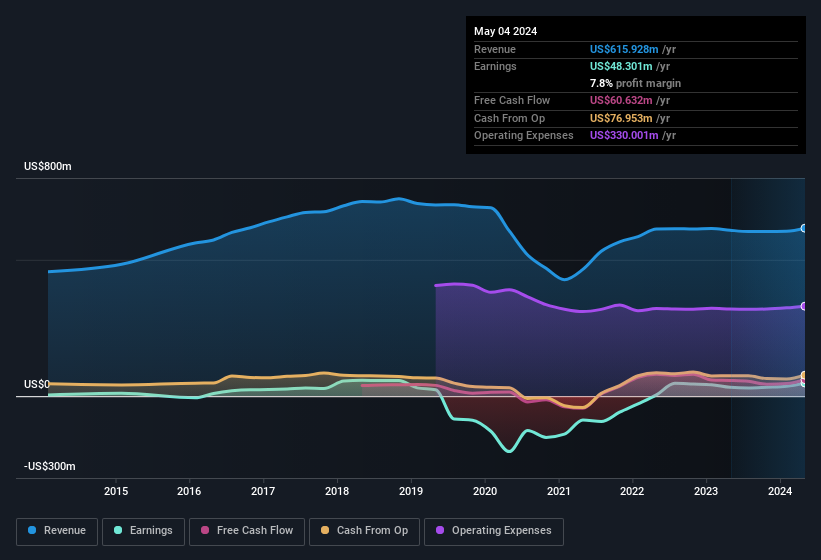- United States
- /
- Specialty Stores
- /
- NYSE:JILL
Investors Shouldn't Be Too Comfortable With J.Jill's (NYSE:JILL) Earnings

Unsurprisingly, J.Jill, Inc.'s (NYSE:JILL) stock price was strong on the back of its healthy earnings report. We did some analysis and think that investors are missing some details hidden beneath the profit numbers.
See our latest analysis for J.Jill

One essential aspect of assessing earnings quality is to look at how much a company is diluting shareholders. J.Jill expanded the number of shares on issue by 11% over the last year. Therefore, each share now receives a smaller portion of profit. Per share metrics like EPS help us understand how much actual shareholders are benefitting from the company's profits, while the net income level gives us a better view of the company's absolute size. Check out J.Jill's historical EPS growth by clicking on this link.
How Is Dilution Impacting J.Jill's Earnings Per Share (EPS)?
J.Jill was losing money three years ago. On the bright side, in the last twelve months it grew profit by 50%. On the other hand, earnings per share are only up 48% over the same period. Therefore, the dilution is having a noteworthy influence on shareholder returns.
Changes in the share price do tend to reflect changes in earnings per share, in the long run. So J.Jill shareholders will want to see that EPS figure continue to increase. But on the other hand, we'd be far less excited to learn profit (but not EPS) was improving. For the ordinary retail shareholder, EPS is a great measure to check your hypothetical "share" of the company's profit.
That might leave you wondering what analysts are forecasting in terms of future profitability. Luckily, you can click here to see an interactive graph depicting future profitability, based on their estimates.
Our Take On J.Jill's Profit Performance
J.Jill shareholders should keep in mind how many new shares it is issuing, because, dilution clearly has the power to severely impact shareholder returns. Because of this, we think that it may be that J.Jill's statutory profits are better than its underlying earnings power. The good news is that, its earnings per share increased by 48% in the last year. Of course, we've only just scratched the surface when it comes to analysing its earnings; one could also consider margins, forecast growth, and return on investment, among other factors. In light of this, if you'd like to do more analysis on the company, it's vital to be informed of the risks involved. Case in point: We've spotted 3 warning signs for J.Jill you should be aware of.
This note has only looked at a single factor that sheds light on the nature of J.Jill's profit. But there are plenty of other ways to inform your opinion of a company. Some people consider a high return on equity to be a good sign of a quality business. So you may wish to see this free collection of companies boasting high return on equity, or this list of stocks with high insider ownership.
New: Manage All Your Stock Portfolios in One Place
We've created the ultimate portfolio companion for stock investors, and it's free.
• Connect an unlimited number of Portfolios and see your total in one currency
• Be alerted to new Warning Signs or Risks via email or mobile
• Track the Fair Value of your stocks
Have feedback on this article? Concerned about the content? Get in touch with us directly. Alternatively, email editorial-team (at) simplywallst.com.
This article by Simply Wall St is general in nature. We provide commentary based on historical data and analyst forecasts only using an unbiased methodology and our articles are not intended to be financial advice. It does not constitute a recommendation to buy or sell any stock, and does not take account of your objectives, or your financial situation. We aim to bring you long-term focused analysis driven by fundamental data. Note that our analysis may not factor in the latest price-sensitive company announcements or qualitative material. Simply Wall St has no position in any stocks mentioned.
Have feedback on this article? Concerned about the content? Get in touch with us directly. Alternatively, email editorial-team@simplywallst.com
About NYSE:JILL
J.Jill
Operates as an omnichannel retailer for women’s apparel in the United States.
Undervalued with solid track record.
Market Insights
Community Narratives



